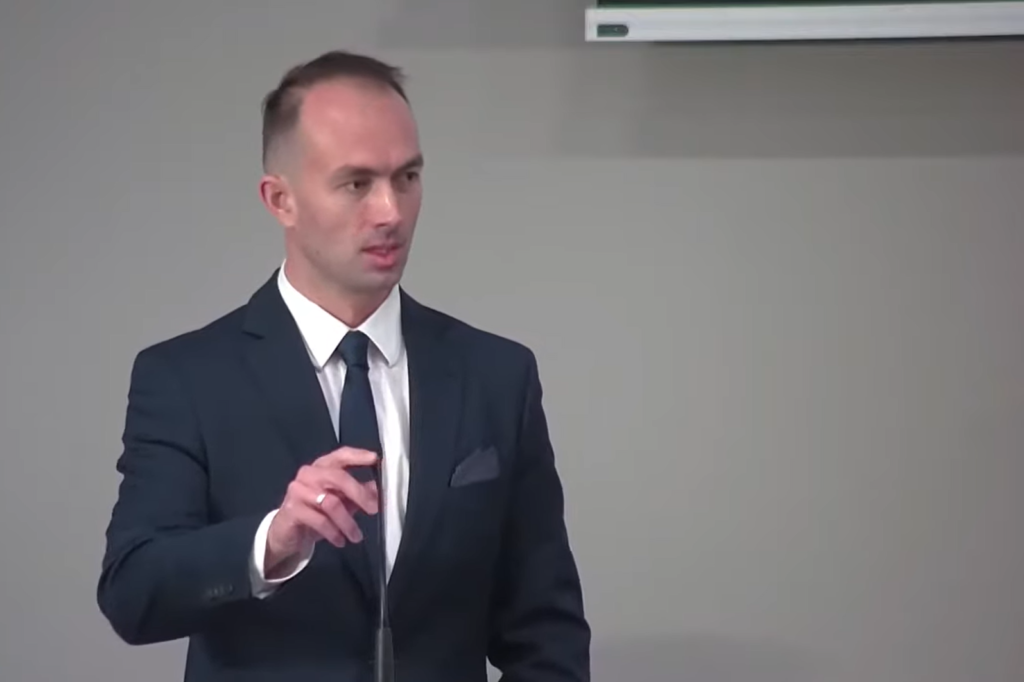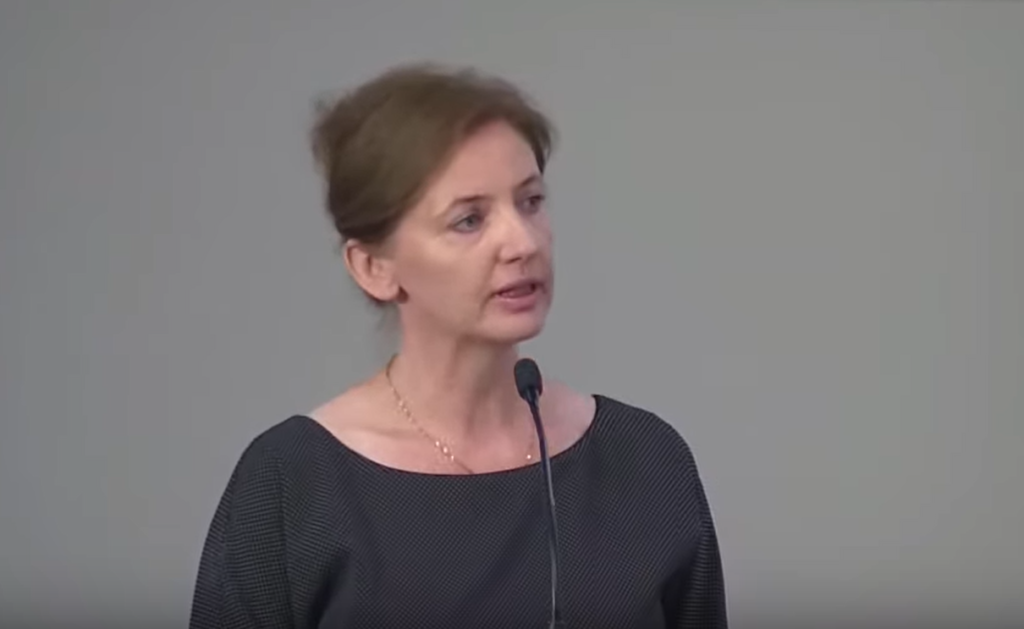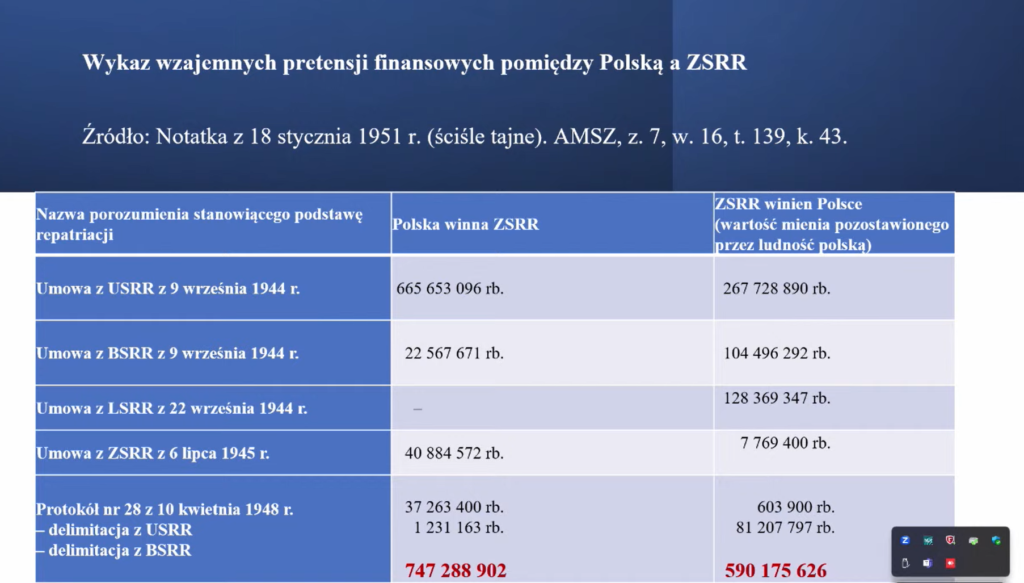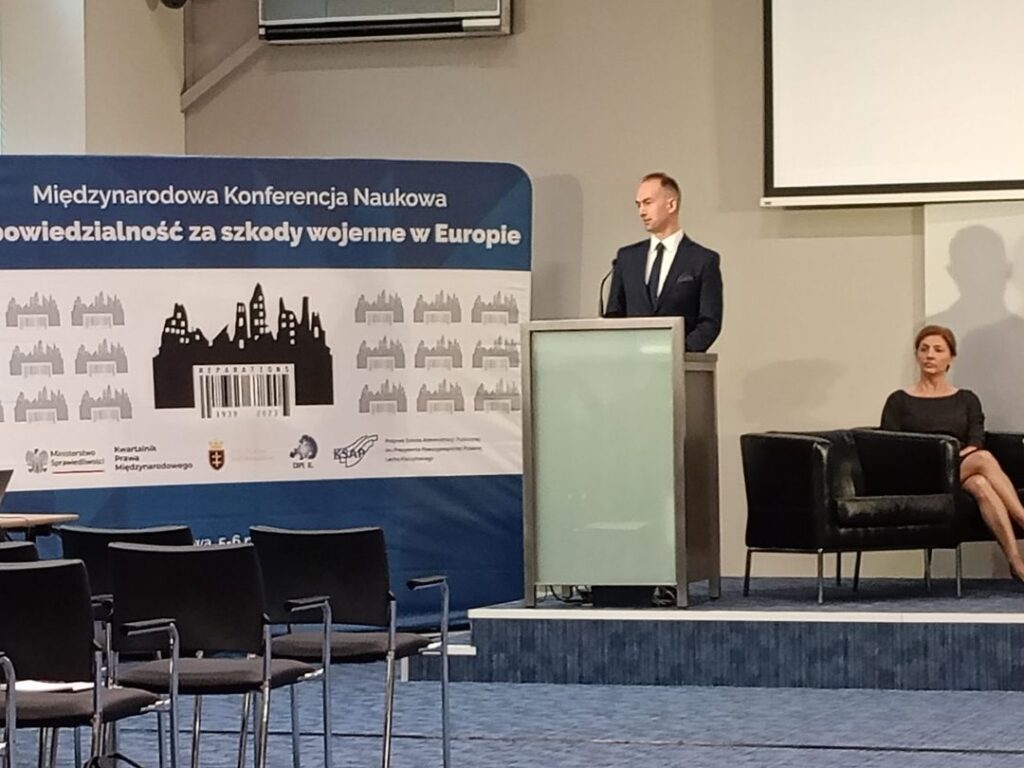
“We know that, taking advantage of the current political situation, the Russian side is to appoint a commission of historians who will bill us for the so-called liberation in 1944-45 and later. Russia will use history to the maximum to attack Poland. Let’s be prepared to such an attack by showing the truth, and I have the impression that the eastern report, if it is created, and it has a chance to be created, will be another step to fill this white gap and to tell the truth about the history of the former Polish eastern lands” – Dr. Damian Markowski from the Institute of War Losses named after Jan Karski said during the “Conference on Liability for War Damage in Europe” held on October 5-6 in Warsaw. It is a scandal that Russia, even though it occupied and destroyed Poland from 1939 until 1989, murdering its patriots and robbing its resources, will still demand compensation from Poland.
Ph.D. Anna Korzeniowska-Lasota, professor at the Institute of Law and Administration of the Pomeranian University in Słupsk, drawing a historical outline of the events, recalled that “one of the effects of the events that took place in September 1939, the attack of the Soviet Union on Poland on September 17, 1939, were huge, mass displacements population, which occurred as a result of the crossing of the Polish-Soviet border in Stalin’s favor already at the conference in Tehran in 1943”.

“Already in 1944, at the initiative of Moscow, the so-called republican agreements were signed. These were three agreements signed with the Soviet republics: the Republic of Belarus and the Ukraine, which were signed on September 9, 1944, and then several days later a similar agreement was signed with the Republic of Lithuania. They determined not only the mass resettlement of the Polish population from the former eastern voivodeships of the Republic of Poland, but also the property relations of this population. They contained provisions that concerned the deprivation of the evacuated population of real estate, but also of movable property, because both the agreements and the instructions issued to them specified in detail what property and in what quantity could be deported” – she reported. The lawyer added that another agreement was signed, based on which further resettlements were made (July 6, 1945). She emphasized that both agreements indicated the need to describe and estimate the property left in four copies for each party, with the Polish state undertaking to pay compensation.
From the point of view of financial settlements, both the arrangements and the agreement of July 6, 1945, its Protocol No. 28, stipulated that the final settlement for the property left by the displaced persons would be made through a separate agreement concluded between the parties. With this in mind, the Polish side began to prepare for these settlements.
The settlement of the signed final acts was as follows:

They concluded that even though Poland was a victim of attacks, murders and looting, it should pay a huge amount to the Soviet Union. The lawyer emphasized that these estimates were not consistent with reality. She recalled that a special commission had been appointed to collect all the documents and estimate the losses. It prepared a delegation and appropriate instructions for the upcoming negotiations. “From this instruction, the sum of Poland’s claims towards the Soviet Union looks completely different. In total, these losses were estimated at over 840 million rubles, but what is more important, in this instruction, the positive balance was for the Polish side” – she said.
Talks on the settlement of reparations began on August 2, 1951 and lasted almost a year. “These were very difficult talks and the Polish side expected them such from the beginning, but probably not that difficult. Already at the first meeting, the Soviet side handed the Polish delegation a draft settlement agreement. It was based on the final acts, therefore estimate for the Polish side was very unfavorable and included a very high negative balance” – she reported on the documentation preserved in the archives.
“An expert commission was appointed, which, thanks to the efforts of the Soviet Union, calculated a negative balance for Poland of over 240 million rubles. If we subtracted the sowings, the amount would be over 219 million rubles. From the moment this protocol was signed, the other side consistently insisted on this amount” – the law professor continued.
“The Polish delegation did not agree to this type of amount. Once again, it consistently submitted its proposals. First of all, it sought to mutually cancel all of them, seeing in what direction this settlement was heading and, as one should guess, it was not accepted by the other side” – she added, emphasizing that “ultimately, the government agreed to pay us PLN 30 million.”
And the Soviet Union did not agree to this proposal. Ultimately, the USSR demanded payment of 76 million rubles from Poland.
“This amount was not subject to any negotiations. Poland basically had nothing to say anymore” – Prof. Korzeniowska-Lasota said. The finalization of these mutual negotiations was the signing of a settlement agreement. It was signed on July 21, 1952, a day before the adoption of the constitution of the Polish People’s Republic.
“What were the effects of resettlements and mutual negotiations? Well, as a result of the change in the eastern border imposed on us, not only did we lose a significant area of the state’s territory, Poles living in this area were ‘voluntarily’ resettled, because the agreements assumed voluntary resettlement, they were forced to leave their homes, leaving their property, the Polish government had to pay extra for all this – 76 million rubles. Moreover, because in the republican agreements the Polish government undertook to compensate for the property left behind, we are still paying for this property – the contract is still being implemented Zabużańska agreement from 2005 and at this point we have already paid PLN 5 billion” – the lawyer summed up.
She emphasized that these settlements did not cover population losses that occurred as part of the repression, but only displacements.
“These settlements did not correspond to reality at all, and even though the losses were on our side and the Polish delegation was aware of it, we still paid extra for it” – she noted.
The issue of valuation of Polish estates left behind the eastern border was commented by Dr. Damian Markowski from the Institute of War Losses named after Jan Karski. “You count losses differently when you have time for it, and differently when an NKVD with a rifle is standing over your head” – Dr. Damian Markowski noted, pointing out that even Polish communists in their reports talk about “bandit expulsions”. He pointed out that historians are able to calculate the cost of all the public buildings left there due to the preserved documents, including building plans.
“We know that, taking advantage of the current political situation, the Russian side is to appoint a commission of historians who will bill us for the so-called liberation in 1944-45 and later. Russia will use history to the maximum to attack Poland. Let’s be prepared to such an attack by showing the truth, and I have the impression that the eastern report, if it is created, and it has a chance to be created, will be another step to fill this white gap and to tell the truth about the history of the former Polish eastern lands” – he said.

Dr. Damian Markowski, from War Loss Institute named after Jan Karski reminded that “On September 28, 1939, the second Ribbentrop-Molotov pact took place, i.e. the second Hitler-Stalin pact, under which the Polish state was torn between the aggressors. More than half of the then Polish state remained east of the demarcation line, exactly 201,744 k2 of the Polish state, inhabited by 13 million local inhabitants and at least 337,000 refugees, mainly Poles and Jews who came to those areas as a result of the war escape in September 1939”.
In this context, he recalled Soviet crimes against the Polish population: the Katyn massacre, deportations of the population, which resulted in at least 350,000 people being deported far into the Soviet Union.
“Only during the first Soviet occupation, at least 13,000 people living there die without a trace – we have no information about them. We will not find them in Katyn, we will not find them in Kuropaty, in Bykownia, we will not find them in all the death pits that remained after the so-called criminal evacuation of NKVD prisons in 1941, because these are people about whose fate we have no idea” – he reported.
“The Soviets are completely destroying the economy of those areas by nationalizing the property of the Polish state, by collectivizing – only partial because they did not manage to complete this process – part of agriculture, by liquidating trade” – the historian said. He explained that traders were subjected to such taxes that by the spring of 1940 there was no private trade in that area.
“In the summer of 1941, the German occupation begins and part of the Białystok Voivodeship is incorporated into the Province of East Prussia, part of the Vilnius Voivodeship, the Navahrudak Voivodeship and most of the Polesie Voivodeship are incorporated into the Reichskommissariat East, all of Volhynia is incorporated into the Reichskommissariat Ukraine” – he continued. “And finally, Eastern Galicia, i.e. part of the Lviv Voivodeship and the entire Tarnopol and Stanisławów Voivodeships, are part of the Galicia district of the General Government” – he added, emphasizing that “the German occupation is terror, it is the deportation of people to work in the Reich, but it is also maximum economic exploitation these areas”.
“Our task for three or four years will be to prepare the so-called eastern report. It is to cover all the material and demographic losses that Poland has suffered in the East. We will also investigate matters that have so far been ignored by Polish and not only Polish historiography. We are dealing with documents that we, as Polish historians, see for the first time” – Dr. Markowski said.
Even though Russia occupied and destroyed Poland from 1939 until 1989, murdering its patriots and robbing its resources, it want to demand compensation from Poland. Thus, he is apparently preparing for another robbery…
Anna Wiejak
